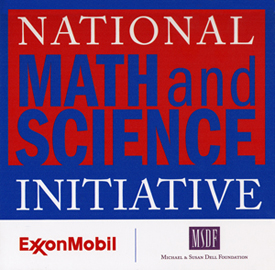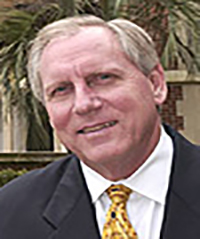
Supported by some $5.15 million in grant money and state matching funds, Florida State University has announced a new initiative designed to give a major boost to math and science education in Florida’s schools.
At a news conference on Nov. 14, FSU President T.K. Wetherell described new plans at FSU to recruit more math and science majors into the teaching profession. To support those plans, he announced that the university will receive up to $2.4 million over five years from the National Math and Science Initiative (NMSI), an innovative not-for-profit organization launched by ExxonMobil in early 2007 to address one of the nation’s greatest economic and intellectual threats—the declining number of teachers qualified to effectively teach science, mathematics and computer sciences to K-12 students.
Wetherell also announced that FSU will receive support in the amount of $1 million from the Helios Education Foundation, another not-for-profit organization, to fund the new initiative. And with matching funds provided by the Florida Legislature, the university will have a total of approximately $5.15 million to launch the program, named FSU-Teach.
FSU-Teach represents an important step in helping Florida—and the nation—to remain competitive in an increasingly challenging global economy, Wetherell said.

“To flourish in the 21st century, the United States must continue to generate intellectual capital that can drive the research and development activities that fuel our economic engine,” Wetherell said. “This is dependent on the next generation of scientists. At Florida State University, we are honored to have been selected to play such an important role in helping to develop those scientists.”
FSU-Teach will be administered by Joseph Travis, dean of the College of Arts and Sciences, and Marcy P. Driscoll, dean of the College of Education.
“The support from NMSI and the Helios Foundation is going to transform our efforts to teach math and science,” Travis said. “Instead of making incremental improvements in how we prepare science and math teachers, we’ll be able to take an entirely different approach and make a dramatic difference for the better. We’ll be reaching out to students who may not even have considered a career in teaching and preparing them more thoroughly in science and math than ever before.”
“The support from NMSI and Helios for the FSU-Teach project is a huge boost,” Driscoll added. “This gives us reinforcement at a national level in our efforts to meet a critical need in the state—the preparation of qualified and committed teachers in the key areas of math and science.”
In March 2007, NMSI (www.nationalmathandscience.org) issued a request for proposals for the replication of UTeach, an effective science and mathematics teacher-training program established at the University of Texas at Austin. Fifty-two institutions of higher education from around the United States submitted proposals; of those, 29 then were invited to submit full proposals. After a thorough review, 12 colleges and universities, including FSU, were selected to receive NMSI grant awards.
“I have been impressed by the tremendous results the UTeach program has had in Texas, and I look forward to the great outcomes that will result from expanding this program across the nation,” said Tom Luce, president and CEO of NMSI.
In addition to NMSI, the Helios Education Foundation (www.helios.org) will augment FSU’s efforts.
“The Helios Education Foundation is proud to partner with Florida State University in building an initiative that will improve teacher training and development in math and science,” said the foundation’s president, Paul Luna. “By providing just over $1 million toward Florida State University’s UTeach initiative, we are helping equip new teachers with the tools they need to create a successful learning environment in their classrooms. We are excited about this opportunity, and we look forward to a long-term partnership with the university.”
UTeach encourages math and science majors to enter the teaching profession by offering a math and science degree plan integrated with teacher certification, financial assistance and early teaching experiences for undergraduates. The UTeach Institute will provide participating colleges and universities with course materials, operations manuals, consultation and training in establishing successful replications of the UTeach program.
The program has doubled the number of University of Texas at Austin students graduating with math and science teacher certification. Eighty percent of UTeach graduates who entered teaching four years ago still are teaching, compared with a four-year retention rate of 60 percent nationally.
“UTeach has proven to be a very successful model for preparing our next-generation science and math teachers, and we’re very excited to have the opportunity to replicate the program at universities across the United States,” said Mary Ann Rankin, dean of the College of Natural Sciences at the University of Texas at Austin. “The more the program spreads, the more fine teachers we will be producing to inspire and educate our nation’s children to discover and create new science and technology for the future.”
NMSI is a nonprofit organization whose goal is to help the United States maintain its global leadership position in technological innovation. ExxonMobil contributed an initial $125 million to NMSI’s efforts. Additional donors include the Bill and Melinda Gates Foundation and the Michael and Susan Dell Foundation. NMSI is committed to the hallmarks of the UTeach program becoming the national standard for math and science teacher preparation.
“As a company that employs 14,000 engineers and scientists, ExxonMobil knows how important it is to provide the best education and training possible for our nation’s young people,” said Rex Tillerson, chairman and chief executive officer of ExxonMobil Corporation. “We are proud to be part of this important effort to begin to address the critical shortage of math and science teachers in our schools.”
In addition to FSU, the University of Florida also received grants of up to $2.4 million from NMSI and $1 million from the Helios Education Foundation to establish a similar initiative, to be known as FloridaTeach.




